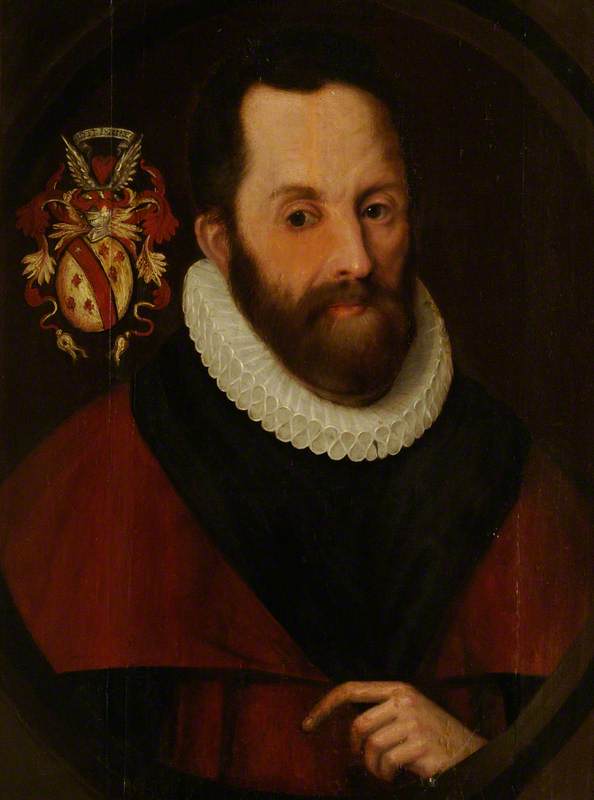George Hakewill (1578–1649) was one of the leading figures in the early 17th-century Church of England. Born into a wealthy merchant family from Exeter in Devon, he matriculated at Oxford in 1595 and was elected to a fellowship at Exeter College in the following year: a remarkable promotion for an undergraduate, and a mark of his precocious talents. He held strongly to the Calvinist, neo-puritan and anti-Catholic views which typified almost all the senior figures in the English church during the first decades of the 17th century, and in Hakewill’s case these were fortified by a period of study abroad which took him to Heidelberg, one of the main continental centres of the reformed church. But after obtaining his Doctorate in Divinity in 1611 he resigned from his fellowship to take up a parochial living at Heanton Punchardon in rural North Devon. He held the living until his death in 1649.
This was an extraordinary move for one of the age’s most distinguished scholars. Hakewill was a prolific author. His magisterial and most famous work, An Apologie of the Power and Providence of God, published in 1627 and reissued in expanded versions in 1630 and 1635, has been described as standing ‘in the first rank of literary and philosophical achievement in the early Caroline period’. It set out a powerful case. Contrary to existing views, Hakewill argued that although worldly change was cyclical, in general progress was visible on all sides—in the arts, in sciences, in law, in medicine, and in much else. The argument was buttressed by an extraordinary range of examples drawn both from history and from current practice. But this was only the most outstanding of Hakewill’s books. He was also the author of a number of more polemical works, mainly directed against Catholics, the papacy, and the Arminian doctrines and practices favoured by Archbishop Laud and his followers in the 1630s.
Hakewill’s early eminence and his known anti-Catholic views brought him to the attention of James I, and in 1612, shortly after his institution to his Devonshire living, he was appointed as chaplain to the young Prince Charles, now heir to the throne after the death of his brother, Henry. In 1613 he prepared Charles for confirmation. The king’s intention in nominating him was to shield the prince from any possible Catholic influences, a task for which Hakewill was well suited. But in 1622 Hakewill forfeited the king’s goodwill and his own position by opposing Charles’s projected marriage to a Spanish (and of course Catholic) princess and writing directly against the marriage. The pro-Spanish direction in which James’s sympathies had now veered cost Hakewill his position at court, and indeed led to a short period of imprisonment. This faux pas, and the long period of Archbishop Laud’s supremacy in the church, which followed within a few years of Charles’s accession to the throne, ensured that Hakewill would never gain the bishopric for which he was otherwise well qualified.
The material focus of Hakewill’s life during his scholarly career lay in the Oxford home from which had resigned in 1611. Hakewill was a contemporary and close friend of the College’s famous head, John Prideaux, rector of Exeter from 1612 to 1642 and regius professor of divinity from 1615 to 1642. The two men shared not only Devonian origins and a fierce Calvinist and anti-Catholic churchmanship, but also a deep concern and affection for their college. Even after Hakewill had resigned his fellowship and moved to his country parish, he continued to spend long periods in his old college, where he retained a room. Still more notably, he paid for the rebuilding of the college chapel in 1622–4, laying out the huge sum of £1200 to this end. In his will he asked to be buried in the chapel, but he was eventually laid to rest in his parish church.
So Hakewill should be regarded not only as a leading scholar and Calvinist churchman but also as an Exeter ‘patriot’, whose heart was always in the institution which he had formally left. My current research project concerns a much less well-studied aspect of his career: his life, family connections and social circle as a Devonshire parish priest. Despite his frequent absences in Oxford, Hakewill rapidly became thoroughly embedded in his new locality. In 1615 he married Mary Ayers, the widowed daughter of John Delbridge, mayor of Barnstaple, the regional capital of North Devon, and five times MP for the town. Thanks to his multiple trading ventures, mainly in America but also embracing Europe and the East Indies, Delbridge was a very wealthy man, probably the wealthiest in the town, and it was perhaps from his father-in-law that Hakewill acquired the means to pay for the rebuilding of Exeter’s chapel. Hakewill and his wife, Mary, had two sons, John and George, before her premature death in 1618. But marriage and children were not only the main factors which rooted Hakewill in his new home. He developed strong links with the local clergy, especially with the vicar of Barnstaple, Martin Blake, who had married Delbridge’s second daughter, Elizabeth. Blake was much troubled during his tenure by the puritan extremists of his parish, men fiercely opposed to the episcopal structure of the established church and to the ceremonies which marked its services and strong supporters of an almost exclusively preaching ministry. In these trying circumstances, Blake came to rely on Hakewill for encouragement and support, enmeshing his friend, if only marginally, in the ecclesiastical politics of Barnstaple.
Hakewill also built up a multitude of other local connections, not only with the neighbouring clergy but also with the local gentry. It was a prominent member of the gentry, Sir Robert Basset, lord of the manor of Heanton, who had presented Hakewill to his living. Basset’s wife was Hakewill’s cousin. The rector of Heanton was clearly a trusted man in the district, often serving as a trustee in land transactions. When, shortly after the Civil War, attempts were made by the parliamentarians to confiscate some of his ecclesiastical property, it was the county gentry serving on the Devonshire County Committee who spoke up for him and saved him from loss. This was not so for the unfortunate Martin Blake, who was ousted from his living for two years. Hakewill’s ecclesiastical connections had a similarly wide remit. He served as diocesan commissary, the bishop’s substitute, under two bishops, and was on good terms with Matthew Sutcliffe, dean of Exeter, and with Joseph Hall, the most distinguished of the four bishops who governed the diocese in Hakewill’s time and a man whose churchmanship was closely aligned with his own. So whether with the Devonshire gentry or with the county’s senior clergy, Hakewill’s influence and standing extended well beyond the limits of his parish.
Hakewill’s will, preserved in the National Archives, provides a further vital guide to his interests and connections. Made in February 1648 and supplemented by a codicil in the following year, it throws a flood of light on his family and friends. His natal family in Exeter feature prominently. His executor was his nephew, John Hakewill, son of another John, Hakewill’s brother, who had been mayor of Exeter in the 1630s. No doubt one of Hakewill’s own sons would have been executor had either survived; but by 1647 both were dead. John, the elder son, had, like his father, been a fellow of Exeter, and in the will Hakewill bequeathed the contents of his son’s college room to another nephew, also a fellow of Exeter, Henry Willett, son of his sister Mary and her husband Henry Willett, an Exeter draper. Nor did Hakewill forget his old college, leaving to his successor in the rectorship his portrait, which now hangs in the college’s senior common room.
Hakewill’s last years were dominated by the Civil War and its aftermath. Barnstaple was in the thick of the conflict. Declaring for parliament at the start of the war, as might have been expected in a place where radical puritanism was so strongly rooted, the town changed hands several times before returning to parliamentary control at the war’s end. For most of this time Hakewill remained at Heanton. He had been elected to the rectorship of Exeter on Prideaux’s resignation in 1642 and briefly returned to Oxford to take up his new post; but by 1644 he had retired to Devon. He commented indirectly on the war and its consequences in the course of his will, writing of ‘this lamentable variety of new and strange opinions now on foot’—an allusion to the rise of religious sectarianism which marked the mid 1640s—and later mentioning ‘the unhappy and unnatural breaches’ in church and state which were both cause and consequence of the war. He died on April 2, 1649, and was buried in the chancel of his parish church shortly afterwards. A hundred years later his successor as rector in the parish recorded a tradition that ‘this good and learned man’ died of a broken heart after hearing of King Charles’s ‘murder’ on January 31, 1649. Hakewill was an old man of 72 at the time of his death. But, loyal and consistent royalist that he had been, the story has at least an element of plausibility.
Hakewill’s life is a well-tilled field. He has a long entry in the Oxford Dictionary of National Biography and he is mentioned and discussed in most of the literature on the religious politics of the period. But his career as a country parson, his local connections, and the relationship between his activities in Devon and those in Oxford, are all topics which have been largely overlooked. Mysteries remain to be investigated. Why did Hakewill resign his college fellowship, held at the centre of the scholarly world, to take up an inferior post, for which he had few qualifications, in a remote part of the kingdom? And what sort of a parish priest did this intellectual and learned man make? Hakewill’s frequent absences from his parish, first at the royal court, acting as chaplain to the young Prince Charles and then at Exeter College, must have meant that for long periods the parish was in the hands of curates, though we hear of only one such curate, active in 1622. Hakewill’s other life, in the locality and away from the scholarly centre, is a quarry worth pursuing: a task in which this author is currently engaged.
John Maddicott was a fellow and tutor in history at Exeter College, Oxford, from 1969 to 2006, and is now an emeritus fellow. He is the author of five books, including a biography of Simon de Montfort and other works on the origins of parliament and on the early history of Exeter College. More recently, the focus of his work has shifted to the 17th century. He is a Fellow of the British Academy.

